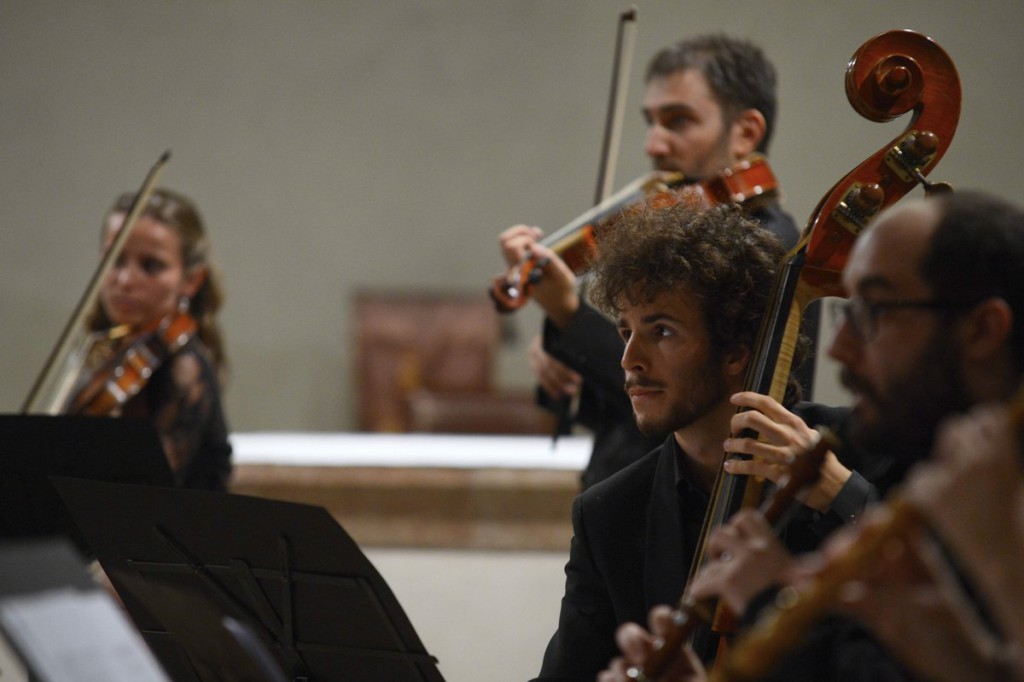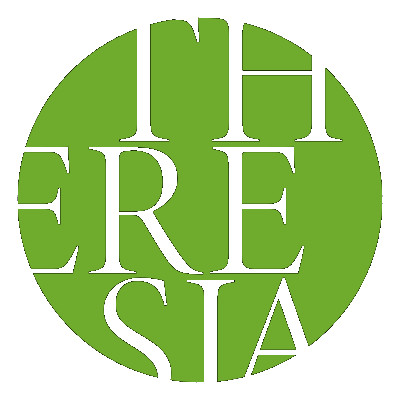
translation by: Charlotte Michi
The youngest member of the orchestra is also the one who plays the biggest instrument: and we could say that he literally is at the basis of the harmony of Theresia, considering that he plays the double bass. Adrien is 21 years old and started his experience with Theresia in May 2014: “I auditioned in 2014: I had heard about Theresia from Klaudia Matlak, which I had met in Strasbourg and who had just played with the Orchestra in the final of Premio Bonporti. She told me about the competition, about the project for young musicians and about the orchestra: I decided to have a try.”
In these years beside the improvement in his instrument Adrien has decided to deepen also the musicological knowledge: “I am studying musicology at the University in Paris and I have just finished an Erasmus in Bologna. The musicological study gives me the opportunity to make a stylistic reflection on the music I perform, and I hope to manage to go on on both sides, the instrumental and the theoretical.”
How was your year of study in Bologna and what do you expect now? “I loved studying in Bologna, also the town is beautiful and full of students; I explored themes linked to the Renaissance music and now I will complete an essay on Adriano Banchieri. Then I will take up university classes in Paris, but I will also start a master in historical double bass.”
Your choice to study historical bass is univocal? Or do you also play “modern music” or even other genres? Frequently double bass players are devoted to jazz: “The historical double bass is my instrument, along with the violone. But sometimes I also play in modern ensembles or orchestras, what changes are the strings and the bow; occasionally I also play in small jazz groups: but I do this for fun. Anyway the concept of earlyinstrument is very broad: beside the vastness of the repertory considered generally “ancient”, ranging from ‘500 to the end of ‘700, it happened to me to perform, with ensamble using original instruments, also Mahler and even Stravinsky.”
Let’s talk about your job in the orchestra: you are a group of musicians all of different countries and schools who meet a week before the concerts to study together: are there some differences in the approach? “Each of us has its features of course, but the group is very united and we manage to fit to each other well also because it’s composed by very good musicians: for me the best are the wind instruments.”
You worked both with Claudio Astronio and Chiara Banchini: what are the differences in their way of working with the orchestra? “Claudio Astronio works more on a macroscopic level and Chiara Banchini more on the details: I think the reason is that Astronio is harpsichordist, and has a strong vision of the whole, of the structure, of the harmony, while Chiara Banchini, as a violinist, has an outstanding sensitiveness for bow strokes, the phrasing, the production of sound. In this sense they are complementary and to work alternately with both is a great occasion to grow. Anyway I think that the orchestra maintains its identity regardless from the conductor.”
What did you like playing with Theresia and what would you like to become part of the repertory? “In this last project I really appreciated playing the Symphony of Boccherini. And I’d like to play Mozart again with the orchestra, after the experience of this summer.”
Are there solo concerts for double bass that you would like to play with the orchestra? “Every musician would like to play as a soloist with the orchestra, and there is repertory for double bass and orchestra, like the concert of Hoffmeister (composer to whom Mozart dedicated a Quartet) and those of Sperger. There is also a big repertory for Viennese bass, a kind of big violone tuned in thirds and in fourth and in Italy the concerts for double bass by Dragonetti and Bottesini.”
How do you see yourself in 10 years? What will you be doing and where will you be living? “Of course I hope I will be still playing both in the orchestra and in chamber groups: if the perspective is that of teaching, I see myself more on the theoretical side rather than as an instrument teacher, maybe because till now I never had the chance to teach double bass. And regarding the place where to live, I don’t know: I love Italy, where I spent one year, but it’s not important where I will be living: I fell European.”



